- Home
- Rae Carson
Like a River Glorious Page 25
Like a River Glorious Read online
Page 25
I’m not sure how you can have something stolen that didn’t belong to you in the first place, but I’m afraid if I say as much, Hiram won’t let me out for the camp meeting tonight.
“I’m sure you’ll handle everything appropriately,” is what I say, and even though I feel dirty and deceitful, Hiram gives me a fond smile.
“Yes, I suspect I will,” he says.
The sun is long gone when we finally step out into the cold autumn air. Even though my arm is firmly lodged in the crook of Hiram’s elbow, I breathe deep of this tiny taste of freedom.
Our camp looks like it’s ready for a dance. Lanterns hang from every shanty and post, and candles surround a wagon turned into a makeshift stage. All this light is an enormous expense, but my uncle’s face shines like he’s a man with no regrets.
I think about the regrets he’ll have when James Henry Hardwick discovers that he can’t pay on time. Every additional extravagance is my uncle shooting himself in the foot again.
Chairs and stools surround the wagon. One log lies across two stumps in a fair approximation of a church pew. Even though the pew is empty, several Indians sit in the mud in front of it, their backs straight, eyes wary. They’re dressed in threadbare shirts and pants, and my step hitches a little. It’s the first time I’ve seen them allowed to wear clothes.
“You made the Indians come,” I observe.
“Muskrat advised against it, but Reverend Lowrey suggested that a sermon about gratitude might go some way toward correcting their poor behavior lately,” he says. “It’s the same reason we sent slaves to church in Georgia.”
“They’re wearing clothes. You’re not afraid they’ll steal from the collection plate?” If Hiram detects the sourness in my voice, he doesn’t let on.
“I’m paying Lowrey a generous fee tonight, to support his missionary work among the miners and the Indians, so there won’t be a collection plate,” he says. “And a church meeting demands modesty.”
He guides me to a pair of chairs and we settle down, side by side. Everyone else is trickling in, too—Chinese, foremen, and several more Indians, herded by watchful guards. I’m delighted to glimpse Jefferson, who gives me a quick tip of his chin. Beside him is Tom, who seems awful thin to me, but his eyes are bright, and when he sees me, he gives me a forced smile.
I twist in my chair and spot Mary. Beside her is Muskrat, dressed in someone’s threadbare long johns. My first feeling is relief—Muskrat is alive!—followed by hope. He and Mary exchange a quick word, and then they look up, as if sensing my gaze. Muskrat meets my eye with a confident, determined gaze and a slight nod of his head. I hope that means the plan is moving forward, that tomorrow will be the day.
Muskrat moves past Mary and joins his own people. They settle on the ground together and talk among themselves. Something makes Muskrat laugh.
Behind everyone stand several other foremen, including Frank Dilley and Wilhelm. All have rifles or revolvers held at the ready. Abel Topper carries his whip.
“Why all the guns?” I ask. Another expense. The night is damp, and most of those guns will have to be discharged of their gunpowder after Lowrey’s sermon.
“A precaution. Topper got word the Indians might be planning something.”
My breath is suddenly icy in my chest. “Then why allow them to attend at all?”
“For the sake of their immortal souls, of course,” Hiram says. “We cannot neglect God’s work even as we seek after industry.”
“How decent of you.”
Hiram gives me a warning look, and his grip on my arm tightens, but I’m spared any scolding because Reverend Lowrey climbs up into the wagon, straightens and smoothens his suit, and opens his huge Bible.
A hush descends, and Lowrey says, “As we prepare to celebrate Thanksgiving, there is one thing we ought to be thankful for above all things: God’s saving grace.” And he launches into a sermon about the most fiery, awful, painful fate imaginable, and how we can avoid it by simply putting our faith and trust in the savior of man.
Lowrey isn’t remarkable as preachers go; I’ve seen better. But his hand-waving tirade about fire and brimstone is the most entertaining thing to happen to this camp since I arrived, and everyone sits rapt as Lowrey works himself into a lather.
The whip cracks behind me.
I launch from my chair and turn, just quick enough to see one of the Indians, eyes glazed with golden lantern light, as he topples face-first into the mud. Abel Topper stands behind him, whip hanging limp.
Everyone is as silent as rabbits in their burrows.
Finally Lowrey hollers, “What is the meaning of this?”
“Beg your pardon, Reverend,” Topper says. “But this man was disrespecting the word of God.”
No one says anything. The Indians beside the toppled man are frozen like statues.
“He was muttering some heathen nonsense to himself,” he insists. “Swaying back and forth. I told him to shut it, but he didn’t listen.”
“Let’s have no more interruptions, yes?” Hiram says.
My uncle grabs my arm and pulls me back down into my chair. I give one last glance to the fallen man. He remains crumpled in the mud, as still as the grave.
Muskrat catches my eye, and I shake my head slightly. Please don’t do anything, I warn silently. Not here, not now, not with all the guns and the foremen wary. Everything inside me tenses up, like I’m bracing to take a beating, as Lowrey picks right up where he left off.
Will no one tend to the fallen man? To my right, Jefferson leans over and whispers something to Tom, who nods. Then they turn to find me, and the look on Jefferson’s face makes my throat tighten. He’s angry and worried sick that something awful’s going to happen, or I don’t know him at all.
Lowrey drones on, with considerably less fire than he started with. He quotes Scripture from the Apostle Paul, enjoining slaves to be obedient and to please their masters in all things.
Gradually I become aware of a hubbub growing around the fallen man. I risk Hiram’s wrath to twist in my seat and take a look.
His companions are whispering and gesturing among themselves. One shakes the fallen man’s shoulders, but he doesn’t respond.
Hiram’s hand goes to the Colt at his hip. Lowrey’s singsong sermon dribbles away. One of the Indians begins to keen, high and loud.
Topper’s whips snaps toward the keening man.
But he misses, snagging the cheek of a Chinese man sitting nearby, opening a line of bright crimson across his cheek.
So Topper tries again, and this time his whip lances across the Indian’s shoulder.
Everyone starts yelling. The Chinese are yelling at the foremen, and the foremen are yelling at Topper, and Muskrat is suddenly beside the other Indians, talking low and fast.
The man who was whipped shakes his head at Muskrat, yelling something back. Muskrat pleads with him.
The mood is like water twitching toward a rolling boil. Everyone has a breaking point. You think you can endure anything, you can take just one more day, and then suddenly you can’t. The smooth surface bubbles over all at once, and fear makes you do something desperate just to escape.
“We need to get you back to the cabin,” my uncle says in my ear.
“They’re scared!” I say. Take the kettle off the fire and the water doesn’t boil. “They want a way out, they don’t want to get hurt. If we just back off, it’ll settle—”
A gunshot pierces the night.
Everyone freezes. Frank Dilley stands there, Colt pointed toward the sky. A warning shot only.
Suddenly a man lurches up, hands aiming for Frank Dilley’s throat. A foreman jumps to Dilley’s defense, knife raised. He stabs the man in the back.
A cry of rage and grief tears into my soul as more leap toward Dilley and the foreman, who disappear beneath a blur of flailing limbs. I can’t tell whether people are attacking, or just trying to climb over to escape.
Everyone is out of their chairs now, the Chinese fleeing in
all directions. Hiram yanks at my elbow. “Let’s go,” he commands.
I am sick with fear, with rage, with disgust, but I recognize an opportunity. “You have to stop this!” I yell. Muskrat’s people don’t have a chance if Hiram doesn’t intervene. He hesitates. “Please, Father!”
It’s the “Father” that does it.
“Get to the cabin and lock yourself inside,” Hiram says. He yanks his gun from his holster and rushes forward. He’s a big coward, though, because he stops short of the fray, refusing to get into the thick of things.
Slowly I begin to back away, glancing around for Jefferson or Tom, Mary or Muskrat, anyone who can give me an indication of what I should do.
Another gun goes off. Someone screams. A ragged thunder of gunshots follows.
I stand frozen, covering my ears.
This was not the plan.
Chapter Twenty-Four
Jefferson is suddenly at my side. He pulls a hand away from my ear and says, “We have to find cover.”
I’m only too happy to comply. He yanks me out of the light and into the shadows. Guns continue to fire. My head pounds with them, and my ears ring.
We reach the Chinese tents. “No one will look for us here,” he says, and he ducks into the headman’s tent, pulling me down behind shelves filled with sundries. In the dark, the jars look like black blobs that occasionally spark with reflected lantern light.
After a moment, my heart calms and my head clears enough to say, “Was this how the plan was supposed to go?”
“No,” he says, his voice fierce. “But it’s the way it’s going now. Same plan, just a day early.”
More shots ring out.
“We have to get to the stockade,” I say, yanking on his sleeve. “The ones who are left, the women and children . . . Frank and Hiram might go for them next. And we have to . . . Oh, God, Jefferson, what’s happening?”
It’s too terrible. A mind is not meant to see these things, or even think of them. But I’ll see them forever. I’ll remember the way that Indian was whipped during the sermon. The knife in the back of the other man. People going down like sacks of wheat, screams of pain. The dead body lying limp in the mud of the stockade. The way the man’s head snapped back when Frank Dilley shot him in the mine, and how his blood sprayed the nearest lantern, casting mottled shadows all over the walls.
Jefferson’s arms wrap around me, and I’m snugged tight to his chest. He smells terrible—of sweat and gunpowder and dirty creek water—but I don’t care. It seems like I’ve wanted his arms around me forever.
He says, “We’ll have to be silent and quick if we’re to get there before Frank and his men.”
I start to rise. “Then let’s go!”
He yanks me back down. “We wait for Tom. We agreed to meet here if things went bad.”
“What if he’s . . .” I can’t finish my own question.
“We’ll give him a chance.”
“And the rest of the plan?”
“Gunpowder is already in place outside the barracks, near the shanty where they stash the rotgut. Someone will set it off. We didn’t get as much powder from you as we wanted, so once it got dark, Muskrat grabbed a couple of the lamps that were lying around for tonight’s meeting and doused the back wall of the barracks with oil. For days, Tom and I have been gradually stacking firewood and blankets and such—anything that catches fire—against the back wall on the inside. Should burn long and hot now.”
“Our guns are in the barracks!”
“Yep. In a chest near the door. We hoped to retrieve a few in the confusion. Might not be able to, if the fire gets out of hand. Either way, I expect Mary will scream her head off about the Indians trying to burn the camp. She’ll convince everyone she saw a whole bunch heading toward the tents with more gunpowder.”
Everything is so much clearer, so much less impossible, when Jefferson is here. “And that will give us time to get to the stockade.”
“Yes.”
“It will be guarded.”
“That’s our biggest problem. Mary was going to take them some moonshine tomorrow, laced with laudanum. Tell them it was on Dilley’s orders, being the thanksgiving day and all, and just because they drew the watch shift didn’t mean they shouldn’t celebrate. It wouldn’t have been enough to knock them out, but it would have made them sleepy and slow.”
Slow enough that they couldn’t aim their guns, especially in the dark.
“It was a good plan,” I say.
“It was Muskrat’s plan,” Jefferson says. “That man is one of the smartest people I’ve had the pleasure to know.” High praise, coming from Jefferson. “But now I don’t know how we’ll get the stockade open,” he adds.
“We’ll think of something. But . . . Jeff? You could have told me everything.”
The bitterness must be plain in my voice because his “How?” comes out sharp and angry.
“I don’t know. Somehow. Mary sees me every morning.”
“Do you have any idea how closely your cabin is watched?”
“I . . . No, I guess not.”
“In order for me to visit your window, we had to count watch shifts, make several bribes, and Mary had to—”
“I’m sorry. You’re right.”
Footsteps sound at the tent’s entrance, and a shadow blocks the night sky. I freeze in Jefferson’s arms, which tighten around me.
Then a voice comes. “Jeff?”
“Tom!” I whisper, launching to my feet and barreling toward him.
He hugs me right back, but only for a second. “We have to reach that stockade and then get out of here.”
“But what do we do about the guards?” I ask.
“Maybe we ask the guards for help?” Jefferson suggests. “Tell them a riot is happening, and Westfall has ordered every able-bodied man to the fight?”
“That might work,” I say.
Tom rubs at his jaw. “Maybe. Especially if it comes from you. Everybody knows you’ve got special status around here. Hiram calls you his lady.”
The thought makes me see red. But if it helps us out now, then I’m glad for it.
“If we’re escaping tonight, we could use our guns. Also, my pack. I have some gold hidden in my mattress. It could pay for our journey back.”
“No time,” Tom says.
“I don’t mind saying good-bye to the gold,” I say, “but my guns . . .”
“We do need that gold,” Jefferson says. “We’re days from home. Maybe weeks. We’ll need supplies on the way, and we’ve got nothing to trade.”
“I won’t be able to stop long enough to find gold along the way,” I add. “Not if we’re pursued.”
The three of us stare at each other.
“We split up,” I say at last.
“No!” Jefferson says. “I’m not letting you out of my sight. Never ag—”
“I can get the guards to leave the stockade. I’m Miss Westfall, right?” I say it bitterly. “They’ll take orders from me. But not if I have you and Tom in tow.”
“She’s right,” Tom says. “Jefferson, you hurry back to the barracks and fetch our guns. Unless it’s too dangerous; use your own judgment there. Meet us at the corral. Lee, you run to the stockade and tell them they’re needed at the mine. Sound a little panicked if you can. Tell them to hurry.”
“What will you do?” Jefferson asks.
“I guess it’s up to me to sneak into the cabin and get Lee’s gold.”
“Absolutely not,” I say. “That cabin is too near the camp meeting. You’ll be seen.”
“Not if Mary has done her job,” he says. “Everyone will be racing to the mine soon enough.”
I hate this idea. I don’t want to let either one out of my sight, but I’m not sure there’s any help for it.
“All right,” I say with no small amount of reluctance. “Tom, the gold is hidden in my mattress. Lift it to find the hole underneath. My bedroom is the one with the quilt hanging in the doorway, along the east side of the cabi
n. There’s a pack in the chest at the foot of my bed. I’d dearly love it, but it’s not as important as that gold.”
“Got it,” Tom says.
“Both of you, promise me that if you can’t get inside quick and easy, you’ll let it go and head to the corral. Don’t take any unnecessary risks.”
“Agreed,” Tom says.
“Agreed,” Jefferson says. “But I don’t want you to lose that five-shooter.”
“Better it than you,” I say in a wavery voice. I’d rather lose a dozen guns than lose Jeff.
An explosion shakes the earth, rattling my very bones.
“That’s our signal,” Tom says. “It’s a fair bet that barracks is on fire now.”
Even though I can hardly see a thing, my gold sense prickles all over, as though the air is filled with sparkling dust. Then comes yelling. Beating footsteps. A female voice screaming—Mary, no doubt.
The golden motes in the air demand to be acknowledged. I know I should make my feet run toward the stockade, but I’m caught by their glory, their warmth. I reach out with my mind in greeting. And the gold comes at me like a swarm of hornets.
Suddenly I’m choking on dust. My companions are, too. We hunch over, coughing.
“Must have been some explosion,” Tom says hoarsely.
Jefferson spits to clear his mouth.
I just stand there, hardly able to breathe, my heart racing. What just happened?
“We’ve got to get moving!” Tom says.
My feet unstick from the ground, and I run from the tent, Tom and Jefferson at my heels.
“Meet you all at the corral,” Tom says, and he dashes off in the direction of the cabin.
Jefferson’s hand on my shoulder spins me around. “Lee,” he says. “I . . .” And he cups my face in his hands and kisses me quick but hard.
Then he’s off running too, toward the barracks, and it takes all my focus to get my feet moving downhill toward the stockade, because I’m terrified and I can’t see hardly anything and I also know with sudden clarity that someday soon I want to start kissing Jefferson and not have to stop.
I skid down the hill in my useless dainty boots, trying to figure out what to say to the guards. What if they don’t believe me? What will I do then?

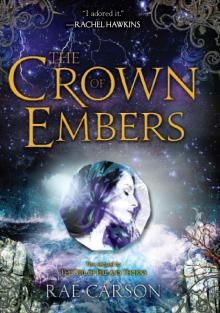 The Crown of Embers
The Crown of Embers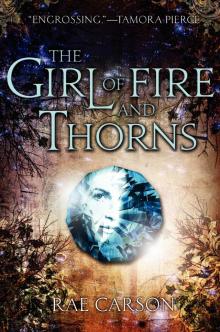 The Girl of Fire and Thorns
The Girl of Fire and Thorns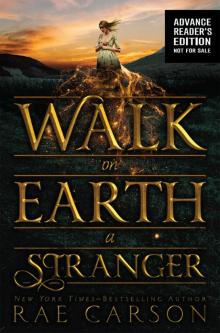 Walk on Earth a Stranger
Walk on Earth a Stranger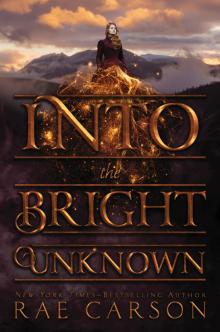 Into the Bright Unknown
Into the Bright Unknown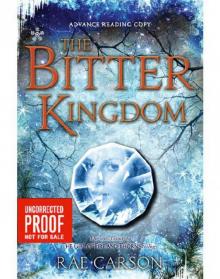 The Bitter Kingdom
The Bitter Kingdom The Rise of Skywalker
The Rise of Skywalker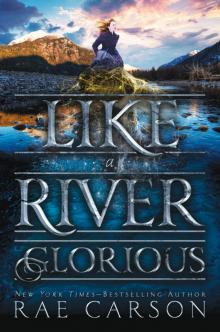 Like a River Glorious
Like a River Glorious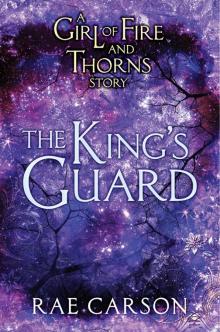 The King's Guard
The King's Guard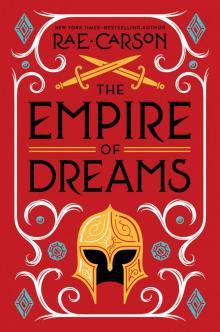 The Empire of Dreams
The Empire of Dreams Most Wanted
Most Wanted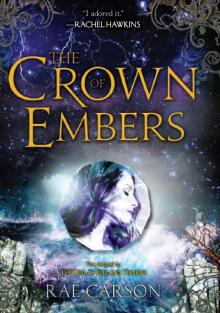 The Crown of Embers fat-2
The Crown of Embers fat-2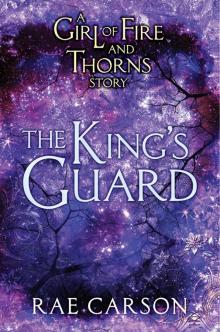 The King's Guard (fire and thorns)
The King's Guard (fire and thorns)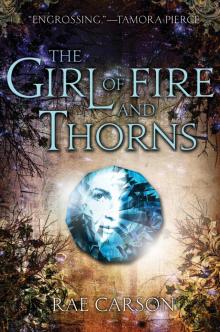 The Girl of Fire and Thorns fat-1
The Girl of Fire and Thorns fat-1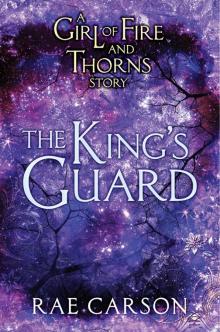 Fire and Thorns 00.7: King's Guard
Fire and Thorns 00.7: King's Guard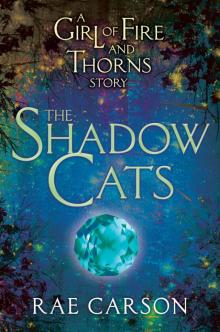 The Shadow Cats (fire and thorns )
The Shadow Cats (fire and thorns )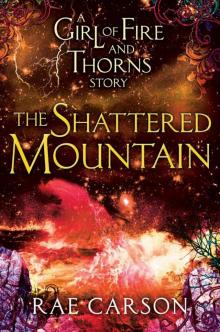 The Shattered Mountain (fire and thorns)
The Shattered Mountain (fire and thorns)